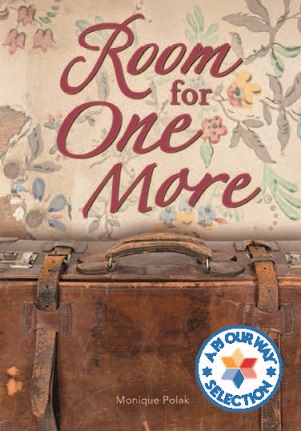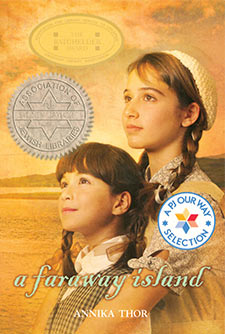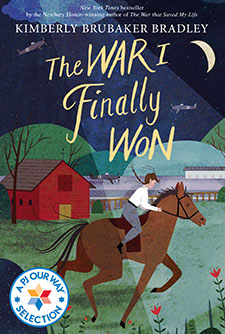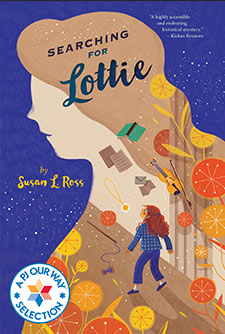Room for One More
Most new brothers arrive in baby clothes – but Isaac’s fully grown! He’s a refugee with a past that’s full of secrets. Will Rosetta’s insatiable curiosity ruin their growing friendship?
Average Rating
( hint: Login to leave a review! )
81 Reviews
Leave Review
What the Book is About
Jewish Content & Values
Positive Role Models
Content Advisory
Talk It Over
More for You
What the Book is About
Twelve-year-old Rosetta and her sisters get a ready-made brother when her family welcomes teenaged refugee Isaac Guttman into their Montreal home. Rosetta and Esther are less than thrilled to share a bedroom, but soon talkative Rosetta and reticent Isaac form a strong bond. Gradually, he opens up to Rosetta about his past and learns to look forward to a brighter future. Isaac’s experience as a refugee and his family’s persecution by the Nazis provide some age-appropriate detail about the Holocaust, but some funny scenes paired with Rosetta’s nosy but well-meaning personality help keep this engaging book from becoming too heavy.
Jewish Content & Values
- Rosetta’s family celebrates Rosh Hashanah with a meal including apples and honey as well as homemade challah. Rosetta fasts on Yom Kippur and doesn’t go to school. She says in a speech that her family doesn’t eat bacon because they’re Jewish.
- Rosetta and her family walk to shul (temple).
- Some of the family’s Canadian friends and acquaintances hold stereotypical views about Jews or are antisemitic.
- Isaac and Rosetta talk about whether they believe in God in the context of the persecution of Jews under the Nazis.
Positive Role Models
- Mr. Schwartzberg travels around Canada trying to find Jewish families who will take in European Jews fleeing the Nazis.
- Rosetta’s family tries to help persecuted Jews as best they can. Their grandmother in England paid for Isaac’s room and board and hosted him for Shabbat dinner when he was alone in England. Rosetta’s whole family decides to welcome Isaac into their family, even though the girls are initially less than pleased about having to share a bedroom.
- Isaac rescues Broderick from drowning despite the fact that Broderick has made antisemitic remarks about Isaac and other Jews.
Content Advisory
Mr. Schwartzberg explains how his parents and brother died; he also describes the conditions in the cattle cars and how his cousin and Isaac’s aunt were trampled to death. Rosetta’s crush, Broderick, makes anti-Semitic comments to Isaac.
Talk It Over
When Isaac, Rosetta, Glynnis, and Glynnis’s brother Broderick are out together, Broderick imitates Isaac’s accent and says that Jews are taking Canadian places at medical school. Rosetta is shocked, but she doesn’t say anything. What would you have done in her position?
More for You
The experiences of Rosetta’s new brother, Isaac, are rooted in historical fact. When war broke out in 1939, all Germans and Austrians in England were classed as “enemy aliens,” which included not just Nazi sympathizers, but also refugees. In 1940, tribunals were set up to decide which enemy aliens should be interned. When the risk of a German invasion grew, all enemy aliens living on the south coast of England were interned, including those previously not thought to be a risk to national security. Rosetta’s grandmother and Isaac were living on the south coast, where almost 1,000 teenaged Kinder were interned. Like Isaac, almost 400 of them were sent to Canada. Despite being classed as enemy aliens, some Kindertransport boys eventually joined the British army.
What the Book is About
What the Book is About
Twelve-year-old Rosetta and her sisters get a ready-made brother when her family welcomes teenaged refugee Isaac Guttman into their Montreal home. Rosetta and Esther are less than thrilled to share a bedroom, but soon talkative Rosetta and reticent Isaac form a strong bond. Gradually, he opens up to Rosetta about his past and learns to look forward to a brighter future. Isaac’s experience as a refugee and his family’s persecution by the Nazis provide some age-appropriate detail about the Holocaust, but some funny scenes paired with Rosetta’s nosy but well-meaning personality help keep this engaging book from becoming too heavy.
Jewish Content & Values
Jewish Content & Values
- Rosetta’s family celebrates Rosh Hashanah with a meal including apples and honey as well as homemade challah. Rosetta fasts on Yom Kippur and doesn’t go to school. She says in a speech that her family doesn’t eat bacon because they’re Jewish.
- Rosetta and her family walk to shul (temple).
- Some of the family’s Canadian friends and acquaintances hold stereotypical views about Jews or are antisemitic.
- Isaac and Rosetta talk about whether they believe in God in the context of the persecution of Jews under the Nazis.
Positive Role Models
Positive Role Models
- Mr. Schwartzberg travels around Canada trying to find Jewish families who will take in European Jews fleeing the Nazis.
- Rosetta’s family tries to help persecuted Jews as best they can. Their grandmother in England paid for Isaac’s room and board and hosted him for Shabbat dinner when he was alone in England. Rosetta’s whole family decides to welcome Isaac into their family, even though the girls are initially less than pleased about having to share a bedroom.
- Isaac rescues Broderick from drowning despite the fact that Broderick has made antisemitic remarks about Isaac and other Jews.
Content Advisory
Content Advisory
Mr. Schwartzberg explains how his parents and brother died; he also describes the conditions in the cattle cars and how his cousin and Isaac’s aunt were trampled to death. Rosetta’s crush, Broderick, makes anti-Semitic comments to Isaac.
Talk It Over
Talk It Over
When Isaac, Rosetta, Glynnis, and Glynnis’s brother Broderick are out together, Broderick imitates Isaac’s accent and says that Jews are taking Canadian places at medical school. Rosetta is shocked, but she doesn’t say anything. What would you have done in her position?
More for You
More for You
The experiences of Rosetta’s new brother, Isaac, are rooted in historical fact. When war broke out in 1939, all Germans and Austrians in England were classed as “enemy aliens,” which included not just Nazi sympathizers, but also refugees. In 1940, tribunals were set up to decide which enemy aliens should be interned. When the risk of a German invasion grew, all enemy aliens living on the south coast of England were interned, including those previously not thought to be a risk to national security. Rosetta’s grandmother and Isaac were living on the south coast, where almost 1,000 teenaged Kinder were interned. Like Isaac, almost 400 of them were sent to Canada. Despite being classed as enemy aliens, some Kindertransport boys eventually joined the British army.




